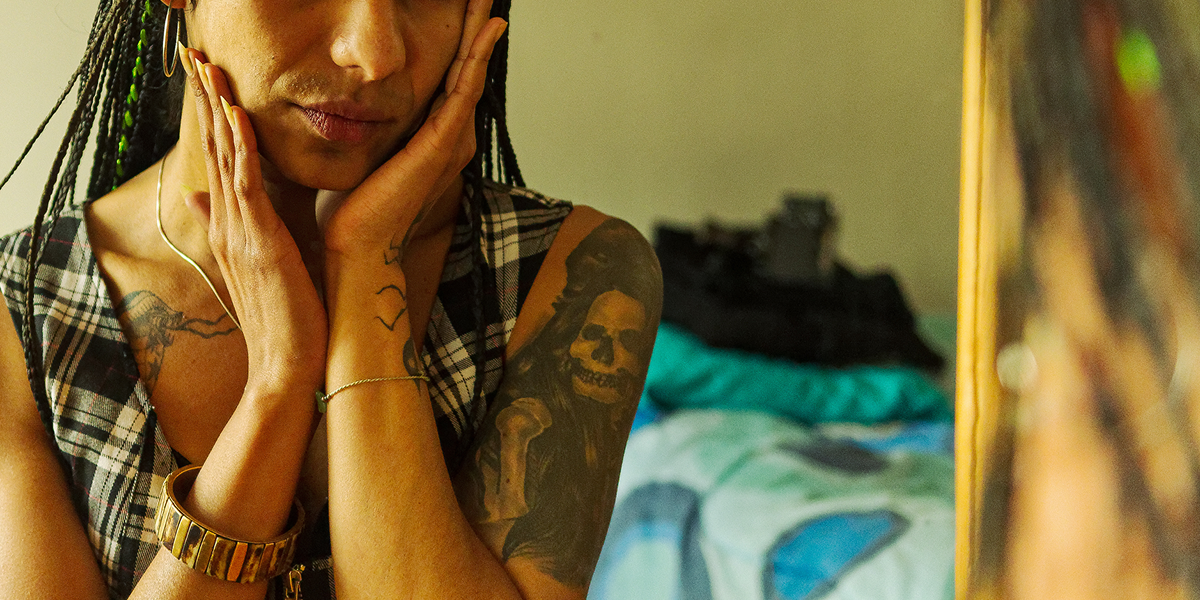Welcome to You Need Help! Where you’ve got a problem and yo, we solve it. Or we at least try.
Q:
So I’ve been diagnosed with depression (and anxiety and OCD and, and, and…) for almost ten years now and I took a four-year break from seeing a therapist when I moved across the country. I’m doing better lately, I think, but there are still so many issues I’m hoping to figure out. Like how to factor my queer sexuality in with my disabled identity. I’ve been completely avoiding sexuality issues for my whole life out of confusion and shame, etc.
Here’s the thing, though. My therapist, despite how nice and helpful she’s been, is completely clueless when it comes to issues regarding disability. I’ve talked to quite a few therapists over the years, actually, and even the better ones seem to be clueless at best. Most of them are actually really dismissive. I’m just tired of looking for metaphors to explain situations and feelings when I’m the one who needs help. Add in my hope for a therapist who’s body-positive and doesn’t suggest a myriad of ways I should change myself? Feeling increasingly hopeless. Do truly helpful, understanding therapists even exist? If so: WHERE ARE THEY HIDING, DANGIT?!
A:
Yes, they do exist! Yes, they are worth it! And yes, they are very hard to find! Stay with me.
First of all, I want to confirm that you’re not alone in your frustration with this process. You aren’t just trying to do one difficult thing, you’re trying to do three: lock down the right therapist, navigate a medical environment while disabled, and integrate disability with queer identity. At the same time! No wonder you’re at your wit’s end. It’s neither a surprise nor a sign of personal failure that you haven’t had much luck so far. The fact that it’s taking a while doesn’t mean you’re doing it wrong; you are fighting multiple battles simultaneously when any one of them is enough to exhaust a person. So I commend you for recognizing that you want more than you’re getting from your therapy right now, and especially for reaching out about it. You haven’t given up — nor should you.
Here’s some real talk, though: most people do not understand disability as anything other than a problem to be solved. So regardless of their role in your life, they will probably not arrive with an affirming, identity-based mindset already in place. That doesn’t mean there’s no hope for them to get there — but it does mean that you have to advocate on your own behalf. I know, I know. It’s exhausting and shouldn’t be necessary and why can’t everyone just get it together and quit judging each other’s minds and bodies? But the fact is we don’t yet live in that world. Self-advocacy remains our best hope at creating it. And in this situation, I think there are a few different steps you can take toward that end.
If you are interested in staying with your current therapist (or at least trying to), it is okay to tell her that the way you’ve been discussing disability together so far isn’t working for you. Be as specific as you can about what you need instead: is the conversation too heavy on “Oh, that must be so hard?” Do you wish she could recommend resources for you? Is she looking at the situation as a diagnosis, when you’re hoping for more of a justice and pride angle? Figure that out for yourself and be ready to talk about it. It’s not clear to me from your question that you’ve actually brought it up; she can’t go in a new direction with you unless she knows that she needs to.
If spitting it out directly feels too confrontational, you can try leading the horse to water: is there a particular book/movie/article/zine/whatever that helped you come to terms with your disability identity? Mention it in session. Ask her if she’s heard of it. Talk to her about why it mattered to you and why you need more resources like that in your life. (If you don’t have any examples yet, might I suggest one of these — they’ll do you good even if you don’t end up discussing them in therapy.) See how she responds; if it seems like she’s getting it, try to tie it back to the way you’ve approached disability together in the past. Or ask her if she can recommend any similar resources — judging by your question, probably not, but trying to find some might be informative for her. The therapist/client relationship is extremely intimate, and as with all relationships of that type, if something is awry you owe it to yourself to be clear on what you need and speak up about it.
But let’s say you decide it’s time to move on to someone new, after trying the above or not. There are, in fact, therapists who specialize in disabled clients (usually among other areas). That may sound like a magical dream from where you’re sitting now — but keep in mind that still doesn’t guarantee they’re the right therapist for you, just like not every therapist with experience in queer issues would be the right one either. Specialists can also mean going out of network, which may or may not be an option. I’d recommend trying out a few folks with various expertise, instead of insisting only on those that pop up when you type “disabilities” into the search field.
My therapist, for instance, is an able-bodied woman who specializes in anxiety disorders and working with creative people. There’s nothing disability-specific in her background. But in my first session, I brought up disability, and especially my interest in disability rights and justice, early and often. I emphasized that I view my disability as an identity rather than an error that needs fixing, because I needed to know she could get on board with that. And she did! I was direct about where I was coming from and she knew she could meet me there. So that would be my first piece of advice on your search: be clear about your disability identity and/or politics up front and see what reaction you get. That can tell you a lot.
You can also ask more specific questions: have they ever had a disabled client before? What’s their background in cultural competency? Do they prefer to give advice, or guide the client as they work things out for themselves? Are they big on recommending outside resources or not? And how do they handle it when a client voices concerns about how sessions have been going? Remember that in initial consults especially, you’re there to figure out whether you’re right for each other. It’s okay to be up front about what you want and need. It’s their job to help you, not your job to be the perfect patient. You’re introducing yourself to them — but the inverse is also true.
Consider different varieties of therapy, too. I went in planning on talk therapy and wound up doing trauma therapy instead, which I never could have predicted or even told you I needed. But switching to a more specific form of treatment completely changed the game and let me dig into the core issues underneath the problems I originally wanted to confront. Same therapist throughout, results night and day. So keep in mind that in addition to the other person in the room, you might benefit from a new course of action. Disability and queerness manifest in so many complex ways that make so many different impacts. You’re allowed to try fresh approaches. (That includes things like doing sessions online, which may expand the pool of therapists available to you.)
One thing that stuck out in your question is how you’re “tired of looking for metaphors to explain situations and feelings.” That suggests, to me, that you’re in search of someone who will directly empathize with your experiences. I’ll be real that you may not be able to get that from your therapist. Disabled people are extremely underrepresented in health professions (all professions, actually, but that’s a soapbox for another post) and finding a self-identified disabled therapist who’s affordable, practices in your area, specializes in the right things, is currently taking clients, and who you actually like might not be feasible. But the good news is there’s a thriving community of disabled folks out there (especially online — say hi in in the comments, everyone!), that you can tap into for that kind of support. I reached out to a queer crip internet friend about your question, in fact, and I think she has it right:
What I have found most useful is having friends my own age who share my disability to talk frankly with about issues. I’m not sure I would want a therapist who is disabled. Not all disabled people (particularly those who are much older/pre-ADA generation) come to the disability experience as I do, or share the same approach to disability identity as I have. Disability is of course wrapped up in all of the issues I have ever spoken about, and with each therapist I’ve been able to further expand my disability identity from those conversations. I find the process of sharing my experience with someone new helps me discover other aspects of myself and the experiences, and brings me to an increased awareness of my own boundaries.
Someone can change your life for the better even if they don’t check every Dream Therapist box. Don’t be afraid to ask the hard questions and be patient with yourself and the world as you figure out what you need from this person, your treatment, and other areas of your life. Remember that therapy is an ongoing process and an evolving relationship. You deserve someone who’s on your team and will guide you toward only those changes that make you feel most powerful. Finding them is more than worth the effort.








Comments
Thank you for this. I’m autistic and asexual; and while I think therapy would help me, I’m having difficulting finding a therapist with experience treating disabled, queer clients. I’ve heard from other asexuals that even supposedly queer-friendly healthcare providers often view asexuality as a disease.
Yes, sadly that’s the case with a lot of medical professionals and asexuality…I feel more comfortable and have had fewer issues telling my medical professionals I’m trans vs ace. I HAVE had positive experiences though so it’s not that there’s nobody out there that is knowledgeable about asexuality, or barring that, willing to learn about it and not medicalize it as An Issue and instead listen to you.
hi in the comments, everyone!
This is one of the best advice posts I’ve read about finding a therapist in general, let alone while working through disability and queerness questions on top of all the other human confusions we carry around.
(Oh, and the syllabus link seems to be broken!)
Fixed! Thanks for the catch (and the kind feedback!).
Finding a therapist can be a challenge and confusing given the many approaches there are. I had a good therapist and still talk to her from time to time using Skype. Online sessions are great solutions for sure.
One suggestion I can give and that is how I found a couple good therapists/psychologists was going to a university and ask around the psychology department. I basically looked up the professors to see what there were focusing on and from there tried to contact them. Many were really open to meet and recommend different people. Some meetings were in person and others sent an email with psychologist names…
If it is possible for you to do it might be helpful.
I had to educate a counselor I was seeing about Spoon Theory. She dismissed it as a “crutch,” and for many reasons I never went back to her.
This is excellent advice. Finding a good therapist is hard but (can be) worth it.
I’ve also had useful, productive relationships with therapists who didn’t tick all of my boxes. And I’ve had not so great chemistry with a couple that sounded great on paper.
I’ve also had pretty good luck going to a center or practice where you do an intake session with someone and then are assigned a therapist (who hopefully will be a good fit). I’ve found a couple queer and queer friendly therapists at a women’s center and a trauma informed therapist at an LGBTQ center. The main issue with going to a non-profit center is that they tend to have a relatively high turnover rate. The advantage is that they often have reduced fees (and occasionally free services).
I’ve been dealing with Chronic dizziness over the past (almost) 6 months and am still awaiting a diagnosis. I have a therapist, who I started working with when this all started, who is great, but she has no idea about my condition and I spend so much time explaining things to her. I don’t think I’ll ever find a therapist who also knows a bunch about Vestibular issues, but this article was helpful.
Thanks for this :)And good luck in seeking the best solution, asker.
I’m aspie and I’m happy with that as far as personality traits/mental traits are concerned. But I have/had social anxiety. When it was really bad, I was scared to go to a therapist because a therapist might take ‘introvert’ (which I’m content being and which is natural to me) and ‘scared of being around anyone’ (which I wanted changed) as part of the same thing. The irony is, I’ve never been so non-aspie as when I had strong social anxiety. All of a sudden, instead of doing my own thing, I was worried about what the social messages were and ‘picking up’ on loads of other people’s ones (probably wrongly, they probably didn’t think as badly of me as I thought they did).
I was lucky to have an aspie friendly GP who wanted an excuse to not do his usual work and whose wife was a therapist. I went there for sessions just talking and learning to be comfortable. But it could have ended badly if I hadn’t had him.
Whenever I read things like this it reminds me why I became a therapist. Because I couldn’t find one that could work with all of me when I needed to. Around coming out. Around acquiring impairments. Around trauma. I just didn’t find people that fit me. I hope you find someone that works for you – because therapy is hard enough with someone that gets you.
This is the why I choosed psychology, we need to speak for us! But I’m dealing with a lot of resistance to put the queer concept in perspective in my educational institution. Brazil is a singular place when it comes to mute this type of discussion. Racism is another BIG tabu, it can’t barely be discussed in class, even when some teacher make some naively racist approach.
This is such an important resource and has really strengthened my toolbelt. Thank you!
I read this piece when it was first published, came back to it several times and then again, more recently, when I was looking for a counsellor. It gave me the confidence to centre my disabled and queer identities in that initial meeting.
Luckily, the first counsellor I met was a good fit. But if she hadn’t been, I was prepared to find someone else. I’d done the research, found a several options and was ready to have different trial sessions to find the right counsellor. This article made me sure that it was reasonable to insist on finding some with the skills and capacity to see me for all of who I am.